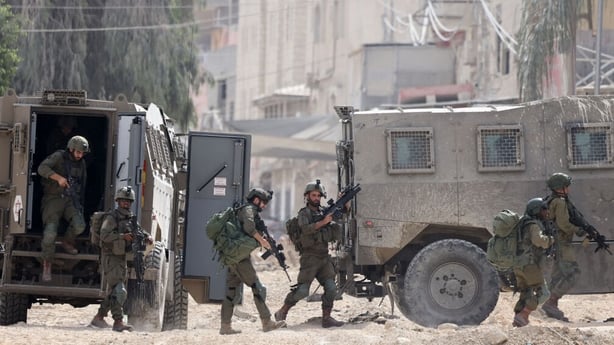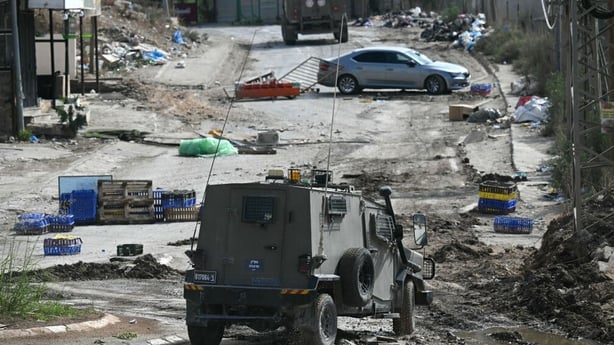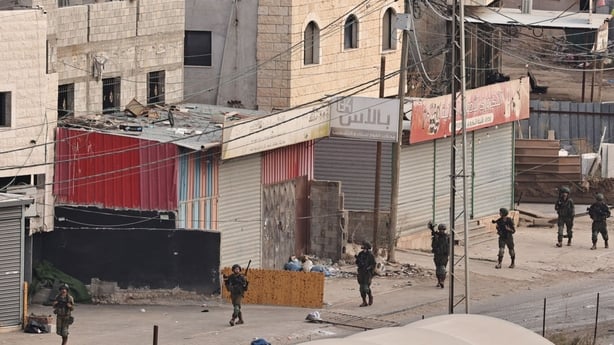The United Nations World Food Programme has temporarily suspended movements across Gaza after it said one of its clearly marked vehicles was struck by at least 10 bullets while approaching an Israeli military checkpoint.
WFP said in a statement that the convoy of two armored vehicles had received "multiple clearances by Israeli authorities to approach" the checkpoint at the Wadi Gaza bridge.
No one in the vehicle struck was hurt.
UN Secretary-General spokesman Stephane Dujarric said: "A clearly marked UN humanitarian vehicle, part of a convoy that had been fully coordinated with the IDF was struck 10 times by IDF gunfire, including with bullets targeting front windows," UN Secretary-General spokesman Stephane Dujarric said.
"This is the latest incident to underscore that systems in place for coordination are not working, and we continue to work with the IDF to ensure that incidents like that do not happen again," Mr Dujarric told reporters.
"We have no way to assess the mindset of those who are shooting at us," he added, noting that it was not clear if information about the convoy's movement had been passed down to Israeli authorities.

It comes after at least 10 Palestinians were killed after hundreds of Israeli troops carried out raids in a large-scale military operation in the occupied West Bank backed by helicopters, drones and armoured personnel carriers.
The UN said the military operation in the West Bank "risks seriously deepening the already catastrophic situation" in the Palestinian territory.
The Israeli military launched a series of coordinated raids across four cities - Jenin, Nablus, Tubas and Tulkarem.
UN Human Rights Office spokeswoman Ravina Shamdasani said in a statement: "This represents the highest number of fatalities over a period of eight months since the UN first started recording casualties in the West Bank two decades ago."
"Many children have been killed while throwing stones at highly protected Israeli security forces, as have other Palestinians posing no imminent threat to life or serious injury," Ms Shamdasani said.
"Such unnecessary or disproportionate use of force and the increase in apparent targeted and other summary killings are alarming."

She said thousands of Palestinians had been arbitrarily arrested and tortured, subjected to unrelenting settler violence, severe restrictions on movement and expression, their homes and property destroyed or seized, and forcibly displaced.
"Israel, as the occupying power, must abide by its obligations under international law," she said.
"The Israeli security forces' use of airstrikes and other military weapons and tactics violates human rights norms and standards applicable to law enforcement operations."
Ms Shamdasani said alleged unlawful killings needed to be thoroughly and independently investigated, and those responsible held to account.
The assault, one of the largest seen in the West Bank for months, followed a series of smaller raids in the area over recent weeks as Israeli forces sought to crush groups of fighters from Palestinian militant groups.
With Israeli forces battling Hamas militants in Gaza and facing a serious escalation of tensions with Iranian-backed Hezbollah in southern Lebanon, today's operation underscored the multiple security threats Israel has been battling since the start of the Gaza war last year.
The armed wings of the Hamas, Islamic Jihad and Fatah factions said in separate statements their gunmen were detonating bombs against Israeli military vehicles in Jenin, Tulkarm and Far'a, a town in the Jordan Valley.
After the initial assault, the sounds of gunfire and explosions could be heard from Jenin's crowded refugee camp, a heavily built-up township adjacent to the main urban district that has been a hotbed of militant activity for years.
Palestinian health authorities said at least 10 Palestinians had been killed in different areas of the West Bank by Israeli forces during the operation.
A short distance outside Jenin, blood soaked the ground next to a damaged car and an impact crater from a drone strike the Israeli military said had killed three militants.
The Palestinian health ministry said troops had surrounded Jenin's main hospital, blocking off access with earth mounds - a measure the military said was intended to prevent fighters seeking refuge.
A military spokesperson said the operation followed a sharp rise in militant activity in recent months, with more than 150 attacks from Tulkarm and Jenin involving shooting or explosives over the past year.
He said the military assessed that there was an "immediate threat" to civilians but that the operation was part of a broad strategy aimed at thwarting attacks.
We need your consent to load this rte-player contentWe use rte-player to manage extra content that can set cookies on your device and collect data about your activity. Please review their details and accept them to load the content.Manage Preferences
"This terror threat in this area is not new, it hasn't started yesterday and it's not going to end tomorrow," Lieutenant Colonel Nadav Shoshani told a media briefing.
As well as the major raids in Jenin and Tulkarm, two of the most volatile cities in the northern West Bank, the military said forces also raided Far'a near Tubas in the Jordan Valley, killing at least four people in a drone strike.
Masoud Naaja, the father of two young men killed in the attack, said he was giving water to some men who asked for a drink when he was wounded.
"In seconds, very fast, we felt like something came down on us from the sky and there was an explosion," he said. "When I put my hand on my chest, it was full of shrapnel and blood."
Clashes in the West Bank have escalated since the start of the Israel-Hamas war in Gaza. Israel, which says Iran provides weapons and support to the militant factions, has stepped up operations, while Jewish settlers have also launched frequent vigilante-style attacks on Palestinian communities.
Thousands of Palestinians have been arrested in raids and more than 660 - fighters and civilians - have been killed in the West Bank and East Jerusalem since the war in Gaza began nearly 11 months ago, according to Palestinian health ministry figures.
At least 30 Israelis have been killed in attacks in Jerusalem and the West Bank during the period, according to Israeli tallies.

The latest round of Israeli-Palestinian violence began on 7 October after Hamas militants stormed from Gaza into southern Israel, killing 1,200 and taking more than 250 hostages, according to Israeli figures.
Israel's Gaza campaign has since demolished swathes of the enclave, displaced nearly all its 2.3 million people multiple times, given rise to deadly hunger and disease and killed more than 40,500 people, Palestinian health officials say.
Internationally mediated talks to end the conflict continue, with Hamas and Israel trading blame for a lack of progress, and the US expressing optimism that a ceasefire can be reached.
US announces sanctions on Israeli settlers in West Bank
The United States has announced new sanctions on Israeli settlers in the West Bank over violence against Palestinians, urging its ally Israel to bring greater accountability.
The sanctions were announced on the same day that Israel launched a wide-scale attack on the West Bank that it said killed nine Palestinian fighters, despite warnings by US President Joe Biden's administration against expanding the war in Gaza.
"Extremist settler violence in the West Bank causes intense human suffering, harms Israel's security and undermines the prospect for peace and stability in the region," US State Department spokesman Matthew Miller said in a statement.
"It is critical that the government of Israel hold accountable any individuals and entities responsible for violence against civilians in the West Bank," he said.
The latest sanction targets included Hashomer Yosh, an Israeli group that has supported the unauthorized settler outpost of Meitarim Farm in the south Hebron Hills.
Volunteers from the group earlier this year fenced off a village whose 250 Palestinian residents had all been forced to leave, the State Department said.
The sanctions against settlers come after Israel launched a large-scale military operation in the occupied West Bank, where the army said it killed nine Palestinian fighters, while the nearly 11-month Gaza war showed no sign of abating.
